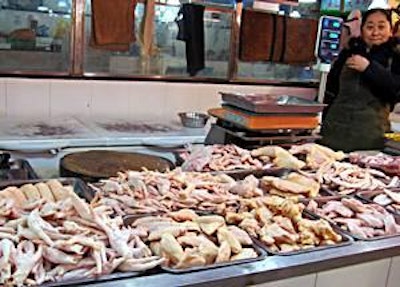
There is an ancient Chinese proverb that states: “To the ruler, the people are heaven; to the people, food is heaven”.
Of course, we all have our own interpretation of heaven. In the case of eating habits, this interpretation varies from region to region and China is no exception.
There is another saying in China that states, “bread comes first”, but this does not mean that food is treated as a basic need, there is a high degree of selectivity in the Chinese diet and this selection changes from province to province.
Many Chinese can now easily afford frozen chicken or processed pork, but rarely buy it. Others include pork as part of their daily menu, whether fresh or not, while some consumers will only buy live chicken and not ready to cook chicken meat.
Table: Per capita consumption selected protein sources 2007
Zhang Fengfeng, for example, a 30-year-old accountant living in Shanghai, notes that she has never bought frozen meat for her family because of her strong preference for fresh food.
Meat of fools
“If fresh meat is sold out, we simply do not eat meat that day,” she says.
Luckily for Ms Zhang, she lives only some 10 minutes away from an outdoor market and is able to take her time picking out the best chicken paws. Those stalls that sell chicken breast meat, however, she passes by.
“My family like eating chicken meat with bones, such as legs, wings and paws,” she says. “But we do not like chicken breast meat at all because it tastes like wood.”
While in some countries breast meat is deemed a premium product, this view is not universally shared. Breast meat is not only absent from Ms Zhang’s shopping list but she views it as the “meat of fools”, believing that only “stupid” people would like the taste. Ms Zhang is not alone in her preference for meat with bones.
Preference for parts
Huang Ying, a 29-year-old freelance reporter, has abandoned supermarkets and gone back to shopping at wet markets to buy her favourite chicken legs.
After returning to Shanghai from the UK, Ms Huang soon found that most supermarkets in the Shanghai region only sell breast meat. Consequently, wet markets, with their wide variety of chicken parts, held more appeal.
Poultry parts are also popular outside of Shanghai. For example, processed duck neck is a well-known snack in Hubei province, while locals in Jiangxi always recommend roasted chicken legs to tourists. In Sichuan province, paws are favoured not only for their taste, but also because of a local saying that states: “Easting more paws, making more money”.
As fresh as possible
In order to eat the freshest meat possible, some consumers prefer eating only freshly killed birds.
Wen Wenxu, a 25-year-old graduate, has plans to be China’s next millionaire and has taken the decision that the route to his goal will be through live chicken.
“As a local, I can fully appreciate how much the Cantonese like eating freshly-killed chicken. If I can sell one chicken to everybody in Guangdong, I can make a lot of money,” says Mr Wen.
To be able to eat the freshest meat, the Cantonese normally keep chicken alive until shortly before cooking. Mr Wen notes that his parents go to the wet markets three or four times a week to buy live chicken.
China has undergone rapid change and the younger generations may hot have the time to buy live birds for slaughter at home, but this does not mean that they cannot eat freshly killed birds. Restaurants and company canteens will also slaughter birds on premises.
Despite this change, many traditions remain firmly in place. The fact that some supermarkets do not stock ready to cook meat sourced from traditional chicken breeds means that consumers still go to the wet market.
Southern residents, especially in Guangdong province and Hong Kong, prefer local breeds such as the San Huang chicken, a small bird with brown feathers.

















